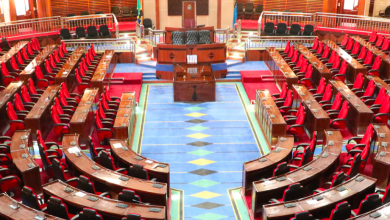If nutrition builds nations, are we building or breaking?

TANZANIA: Imagine this: You are a parent. You serve your child a full plate of food every day. But what if you are told you that despite the full belly, your child might still be lacking some nutrients, because the diet is not balanced? That’s not a riddle. It is hidden hunger. And according to Partnership for Nutrition in Tanzania (PANITA) Executive Director Tumaini Mikindo, this is a national emergency.
Here, he chips in saying: “Malnutrition is a cross-cutting issue,” he explains. “It demands more than the health sector and only 20 per cent of the solution lies there. The other 80 per cent? It is everyone else—agriculture, education, water, sanitation, and economic planning.”
In short: poor nutrition is not just about food. It is about mindset, culture, and policy.
In actual sense, we tend to think of malnutrition as a skinny child in rags. But these days, it is just as likely to be a potbellied toddler slouched on a smartphone, spoon-fed sugary porridge. Mikindo calls it “hidden hunger”, because it is malnutrition that doesn’t always look like starvation.
And here’s the plot twist: some effects, like stunting, are irreversible. Let that sink in. “Once a child is stunted, you can’t undo it. It is for life,” Mikindo warns.
This is not just tragic on a human level, it is economic sabotage. A stunted population means fewer healthy, productive workers. A struggling workforce means a less competitive economy. And yes, that means fewer jobs and lower national income.
Back to the Future: What Nyerere knew
According to Tanzania Food and Nutrition Centre (TFNC) Research Officer-Economics Institution Geofrfrey Chiduo the Founding Father of the Nation-late Mwalimu Julius Nyerere named ignorance, disease, and poverty as the three main enemies of Tanzania and all the three are tightly tied to malnutrition.
He noted that Mwl Nyerere was not just philosophizing. He pushed the message that “Agriculture is Politics” and “Agriculture for Survival”- slogans meant to shake Tanzanians out of dependency and into food sovereignty.
Thanks to that legacy, the Tanzania Food and Nutrition Centre (TFNC) was born in 1973 out of that idea. Think of it as the national brain in the war against malnutrition.
From Talk to Table: Big moves in policy
Let’s not pretend Tanzania has been sitting idle. Since 2010, we have joined the Global Scaling Up Nutrition (SUN) Movement, pushed nutrition coordination to the Prime Minister’s Office, and hired nutrition officers in every region and council.
In 2013, the government even launched a full-on campaign with this call to arms: -“Good nutrition is the foundation for sustainable development – play your part.”
Clearly, nutrition is no longer a side dish. It’s a national priority.
So how does Tanzania actually plan to fight this battle?
It is through a blend of ambition, science, and serious coordination. TFNC is leading the charge with a multi-sectoral plan that covers food, health, education, social protection, water, and sanitation. Key strategies here include: making sure nutrition is actually funded in ministry budgets. Engaging influencers like retired leaders, religious figures, artists, and media.
Integrating nutrition into legal frameworks like the Salt Iodization Law, food fortification regulations, and maternity leave policies.
According to TFNC, “nutrition must move from being a health issue to a development issue.”
However, according to PANITA Program Coordinator Jane Msagati we need boots-on-the-ground programs meant to improve nutrition outcomes.
Here, she mentions provision of Vitamin A drops and deworming for children under 5; Iron and folic acid for pregnant women; School meals in primary and secondary schools; Fortifying flour and cooking oil with essential nutrients.
Her list also runs treatment of severe acute malnutrition, village health and nutrition days; national plans to tackle adolescent health, HIV/AIDS, and non-communicable diseases.
The Global Picture: We are not alone
Globally, 88 per cent of countries face more than one type of malnutrition. Yes, 150.8 million kids are stunted. But 2.01 billion adults are overweight, and 462 million are underweight.
She points a grim picture of Africa that is home to 58.7 million stunted children aged 5 years and below. Again, only African Union countries have stunting rates below 20 per cent; 38 per cent of countries report anemia in over 30 per cent of women; malnutrition costs Africa 1.9 per cent to 16.5 per cent of GDP.
Tanzania? We are in the mix, with 30 per cent stunting, 59 per cent anemia in under-fives, and a dangerous rise in obesity.
2030 Goals: Tall orders, short time
The World Health Organization (WHO) set bold targets for 2030 as cut stunting in under-fives by 40 per cent; halve anemia in women; cut low birth weight by 30 per cent; keep child overweight below 5 per cent; boost exclusive breastfeeding to 60 per cent, keep wasting under 5 per cent.
Achievable? Only if nutrition is baked into every sector’s policy and practice, not just health clinics and food aid programs.
Tanzania’s Headaches: And they are not just hunger pangs
Even as stunting rates fall, the number of affected children has risen (from 2.7 million in 2014 to over 3.4 million in 2022). Meanwhile, there is a boom in overweight children and abdominal obesity, which is a gateway to diabetes, heart disease, kidney failures, some cancers.
You would think regions that produce plenty of food would fare better. But poor dietary diversity is a major problem, even in food-rich zones. And there is a shortage of nutrition experts at the village level. Funding is scarce. And in low-income households, eating balanced meals is a luxury.
So, before you run to the fridge or scroll past this problem, consider this call-to-action:-Educate others and talk about malnutrition in your family, church, office, or WhatsApp group.
ALSO READ: Directives issued to strengthen nutrition
Support public figures advocating for nutrition. Artists and religious leaders can be powerful allies.
Champion school meals and food fortification- demand government accountability.
Push for data-driven policy and better stats mean smarter decisions.
In a nutshell, it is about cognition, immunity, and dignity. It is about whether Tanzania grows into a nation of healthy innovators or drags along a generation stunted in both height and potential.
This is because nutrition builds human capital and without human capital, we shall all forget about national development.
So, let us stop feeding the problem and start feeding the future. After all, if we are what we eat, then Tanzania’s future depends on what’s on every child’s plate today.





